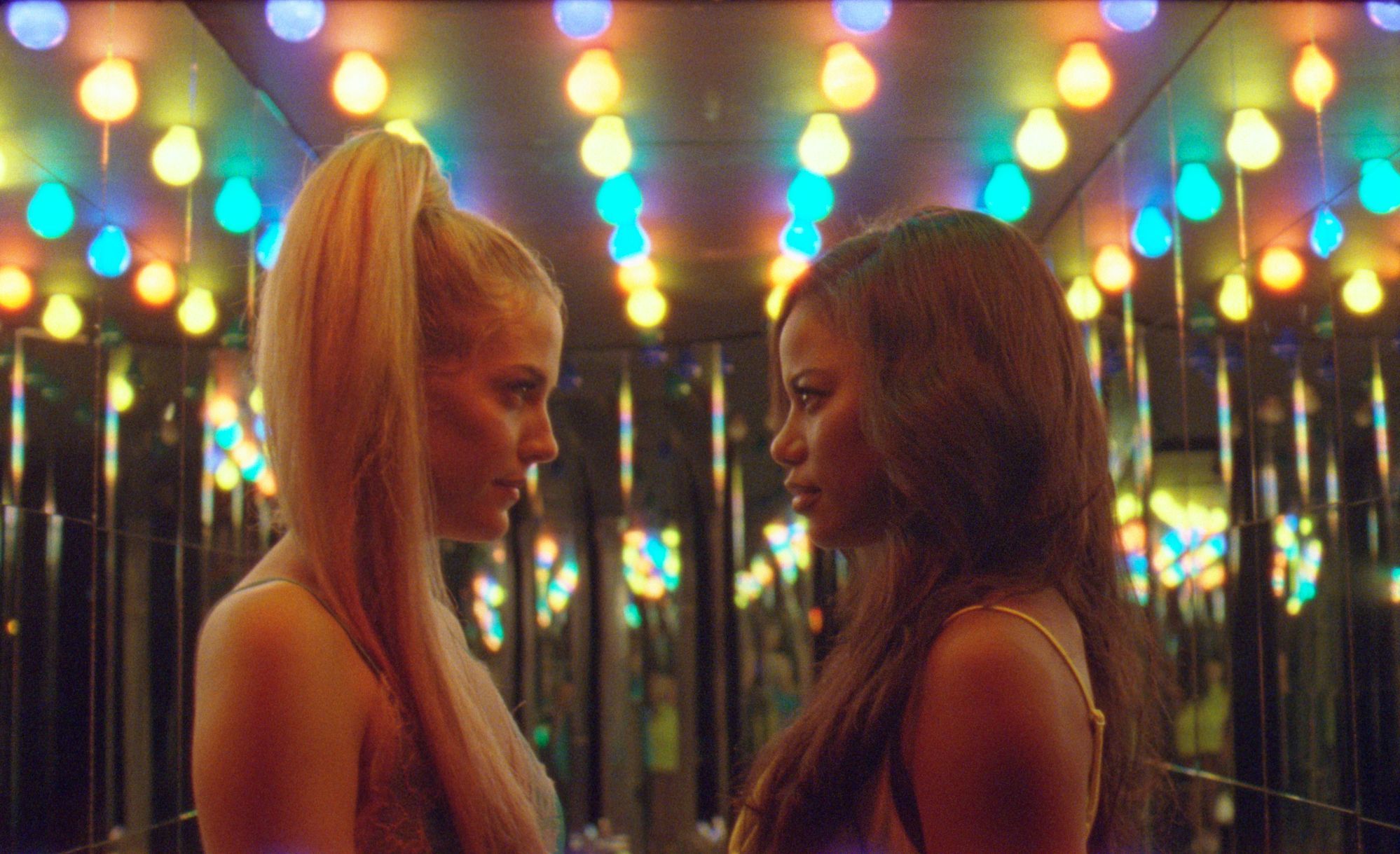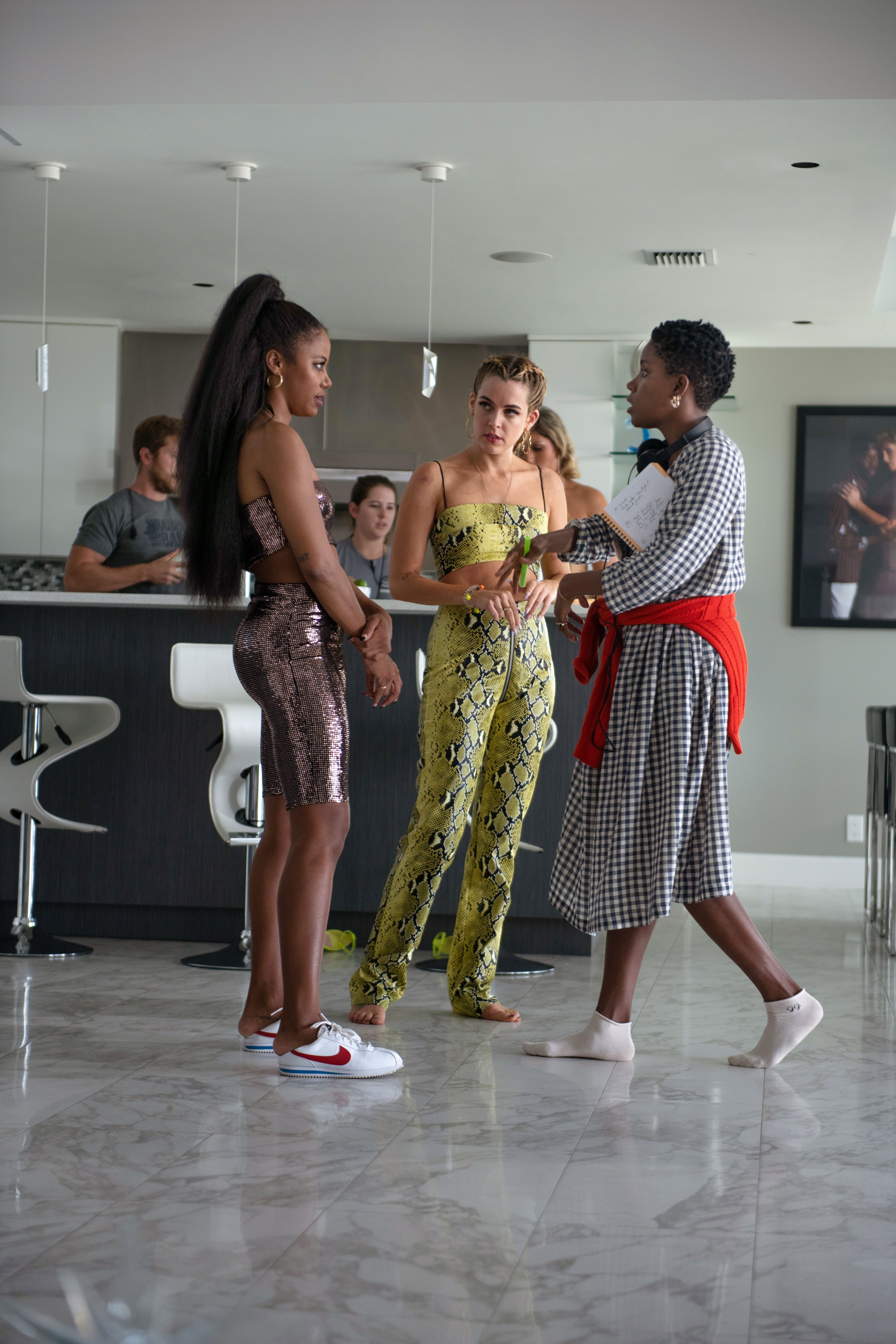Spoilers ahead.
The postponed and much-awaited comedy-drama Zola has finally arrived like a prettily packaged gift with scented tissue paper. Only that gift actually contains a grenade inside. What starts out as a tale of two beautiful young strippers—Zola, played by Taylour Paige (Boogie, Ma Rainey’s Black Bottom), and Stefani, played by Riley Keough (The Lodge, The Devil All the Time)—embarking on a road trip to dance in Florida quickly evolves into a messy, mayhem-filled, murderous 48-eight hour ordeal. Releasing June 30, Zola, directed by Janicza Bravo (Lemon) and co-written with the lauded playwright Jeremy O. Harris (Slave Play), will soon be enshrined as a social media-age cult classic. It’s the first film to be adapted from a series of tweets—148, to be exact—posted by the real Zola, A’Ziah “Zola” King, in October 2015. In what’s now considered to be the first-ever Twitter thread, King narrated her viral and wildly entertaining “hoe trip” with a fellow white exotic dancer named Jessica, whom she met months prior. Stars like Solange, Missy Elliott, and Ava DuVernay praised King’s storytelling. Black Twitter minted it the “Thotyssey,” likening King to a Black millennial Homer for her witty and epic prose.
Bravo transforms that prose into an addictive cinematic experience that harnesses glamour, sex trafficking, Internet culture, race, and megalomania. The feature kicks off at a Hooters in Detroit, where Zola waits on Stefani and a friend. They quickly chat each other up (“vibing over our hoeism,” as King said in her Twitter thread), bond over their exotic dancing experiences, and exchange numbers. The next day Stefani invites Zola on a weekend dancing trip to Florida to make five grand a night. Zola agrees only after pressing Stefani on who else is joining and discovering that Stefani’s bumbling and neglected white boyfriend, Derrek (Nicholas Braun, Succession), and a mysterious Black roommate who goes by X (Colman Domingo, Candyman) will also be along for the ride. During the drive down, they pass Confederate flags and “Jesus Saves” signs, and gleefully sing along to Migos’s “Hannah Montana.” They arrive at a janky motel room in Tampa, and Derrek stays behind while X takes them to the strip club. The girls dance but pull in little money, with Stefani warning Zola that X will ask how much they made.
Realizing that she’s been duped by Stefani, Zola comes to understand that she and Stefani are not really there to dance but to “trap”—have sex with men—while being coerced by X, who’s really Stefani’s Nigerian pimp. The innocent selfies Zola took with Stefani in the strip club were sneakily posted on the sex site Backpage. Zola cringes with clear discomfort and grapples with knowing that she has entered an incredibly violent space rife with misogynoir. One of her many survival mechanisms when finding herself in tense moments is answering in monosyllabic statements like, “Word.” But Zola’s wit and whip-smart intuition carry her through this traumatic two-day debacle. When X drives the women to an upscale hotel for the clients he’s lined up for Stefani, it’s Zola who elevates her sexual worth in bed. “Pussy is worth thousands!” she says before increasing Stefani’s rate from $100 to $500 on Backpage with a burner phone. By the end of the night, the pair make eight grand.
Zola’s wit and whip-smart intuition carry her through this traumatic two-day debacle.
Zola is darker and more sadistic than the glossy Hustlers (2019), but sits in its own lane. It’s adjacent to the Starz series P-Valley (2020). Helmed by Katori Hall, the cable series showcases the richness and complexities of Southern Black women and femmes in stripper culture. We see this parallel in one hilarious moment when Zola and Stefani arrive at the strip club in Tampa, and reality TV star and activist Ts Madison leads the dancers in a prayer circle, begging God to “send us n****s with culture and good credit!” Bravo envisioned Zola existing in a space where “’Bodak Yellow’ and Blue Velvet meet.” The visionary filmmaker compared Zola’s frenetic pace to that of Hieronymus Bosch’s disturbing masterpiece, The Garden of Earthly Delights. The triptych’s panels illustrate a scene that shifts from celestial paradise to sexual debauchery to human degradation. Similarly, Zola starts with a casual encounter between two young exotic dancers, unfurls into sexual labor, and then descends into rival pimps, guns, and physical violence against women.
There is an abundance of care present in Zola, which Bravo exercises throughout the entire film. A care for women’s bodies, intimate gestures, fabulous outfits, and female friendships, even when those friendships fracture. Despite the sex work Stefani performs, there is no female nudity in the film, only a comical montage of penises in an array of varying shapes and sizes. As a Black woman director, the Afro-Panamanian American Bravo demonstrates specific care with how she represents Black women’s bodies. Paige’s brown skin glows; it’s luminous and shimmery under the soft and glam lighting, her long feline-like body mesmerizing as she glides up and down the pole. (Paige has a classical dance background but trained undercover at Crazy Girls in L.A. for three weeks.) Bravo executes dreamy little sequences against mirrored walls where Zola fantasizes different personae for herself: a Hooters waitress, a Playboy Bunny, a sex goddess twerking in an assless catsuit. The kaleidoscopic visuals leave you swooning.
It’s wonderful to see Paige flourish under a Black woman’s direction (her first lead in a feature was in Stella Meghie’s indie Jamaican-American family drama, Jean of the Joneses). The trust, the risk taking, the boundary pushing, it’s all there on-screen to be fully taken in, frame by frame. Derica Cole Washington, Zola’s costume designer, possesses a dazzling eye, dressing both actresses in a series of pastel-colored minidresses and shiny, skimpy fits. Even Domingo, who plays the sinister and repugnant X, looks dapper as hell in his silk shirts, linen pants, and flashy rattlesnake shoes.
There is also special care taken with the portrayal of Stefani, who is a deceitful and treacherous lying white woman. She displays zero guilt over fooling Zola about dancing in Tampa (turns out she’s tricked women before), feigns fragility, and cries white woman tears to evade any culpability. Stefani speaks in a Southern Blaccent, wears cornrows, gels down her baby hairs, and describes a Black woman with phrases such as, “This bitch with a nappy-ass head was up in my face!” She thoroughly humiliates her bipolar and suicidal boyfriend, Derrek, with every opportunity she gets. In a brief, genius scene, Stefani tells her side of the saga, presenting herself as a faultless, God-fearing Christian in a carnation-pink skirt suit who goes on a crude, racist tirade about Zola’s appearance and cleanliness. Yet, as awful as Stefani is, it’s heartbreaking to see the harrowing pitfalls of sexual exploitation that she endures. She is unable to keep a single dollar of her hard-earned money to feed her own daughter, because X cruelly reminds her that her hair extensions, nails, and clothing—which he pays for—are expensive. When Zola and Stefani knock on a hotel door in Tampa, Stefani is abruptly snatched up by two burly men and later found slumped over in a closet with a bloody lip.
James Franco was originally attached to coproduce and direct this film, along with two white male screenwriters, which would surely have smelled of Spring Breakers (2012). I can only imagine the kind of fratty, douchey, racist, and misogynistic 90-minute spectacle Zola could’ve been under Franco’s guidance. In Bravo’s Zola, Paige steps into King’s shoes truthfully, (King once told Paige, “You’re so me it hurts”), from her high ponytail and hoops down to her towering stripper heels. Zola’s voice is centered and prioritized. Despite Zola entering a physically harmful and sexually violent space, she continues to exercise personal agency and practices the power of “no” over and over again.
When X arrives at a Tampa hotel to confront rival pimps who have abducted Stefani, he admonishes Zola, “You’re supposed to be looking out for her!” She replies succinctly, “Who’s looking out for me?”
Source: Read Full Article









